GALLUP NEWS SERVICE
PRINCETON, NJ -- Republicans in America today remain deeply distrustful of the national news media -- in sharp contrast to Democrats, who have a great deal more trust in the media's accuracy. Overall, less than half of Americans, regardless of partisanship, have a great deal or a fair amount of trust in the mass media. Nearly half of Americans -- including over three-quarters of Republicans -- perceive the media as too liberal while fewer than one in five say the media are too conservative. Americans are less likely to perceive bias in their local news media than in the national news media.
Basic Trust in the Accuracy of the News Media
Gallup's annual Governance poll, updated Sept. 14-16, 2007, uncovered high levels of distrust today on the part of Americans about most aspects of their government, and found a continuation of the high level of dissatisfaction with the way things are going in the country seen for the past two years.
Given this generally negative environment, it is not surprising to find that Americans also give the mass media low trust and confidence ratings.
The Governance survey shows that only 9% of Americans say they have a great deal of trust and confidence in the mass media to report the news "fully, accurately, and fairly," while another 38% say they have a "fair amount" of trust in the media to do this.
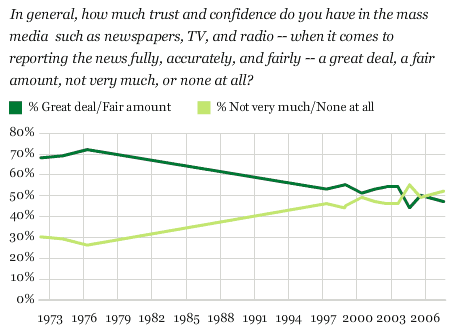
This combined 47% great deal/fair amount rating is essentially unchanged from the media trust ratings from 2005 and 2004.
However, these three recent ratings are all lower than the ratings Gallup obtained in surveys conducted in the late 1990s through 2003, in which at least half of Americans said they had a great deal or a fair amount of trust in the accuracy of the news media.
Gallup had previously asked this "trust in media" question in the 1970s, when trust levels were much higher than they are today. In fact, in one Gallup survey conducted in 1976, 72% of Americans said they had a great deal or fair amount of trust in the news media.
Partisan Differences
There are profound differences in trust in the news media to report the news fully, accurately, and fairly between Americans who identify themselves as Republicans and those who identify as Democrats.
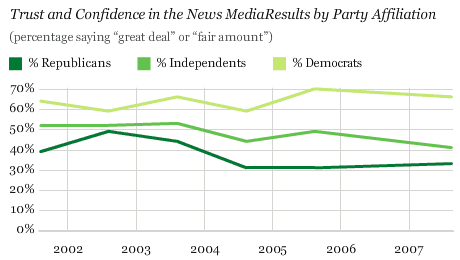
In this year's survey, exactly half as many Republicans as Democrats say they have a great deal or a fair amount of trust in the news media. Independents tend to be closer to the largely cynical views of Republicans than to the more trusting views of Democrats.
The differences between Republican and Democratic views of the media have been evident throughout this decade, although in the September 2002 Gallup survey -- one year after the 9/11 terrorist attacks -- the gap between Republicans and Democrats was not nearly as large as it has been in the past four surveys.
Gallup's June 1976 survey on trust in the media by party showed a much different picture.
|
Trust in the News Media June 1976 Gallup Poll |
|||
|
Republicans |
Independents |
Democrats |
|
|
% |
% |
% |
|
|
Great deal |
10 |
17 |
23 |
|
Fair amount |
53 |
55 |
52 |
|
Not very much |
30 |
21 |
20 |
|
None at all |
6 |
7 |
3 |
As can be seen, the gap in trust levels between Republicans and Democrats was not nearly as large then as it is today: in 1976, 63% of Republicans told Gallup interviewers they had a great deal or a fair amount of trust in the accuracy of the news media, compared to 75% of Democrats.
Bias in the Media
One reason for this general distrust of the media is the fact that only about a third of Americans today say that the news media are "just about right" when it comes to ideological balance. More than twice as many Americans say the news media are too liberal (45%) rather than too conservative (18%).
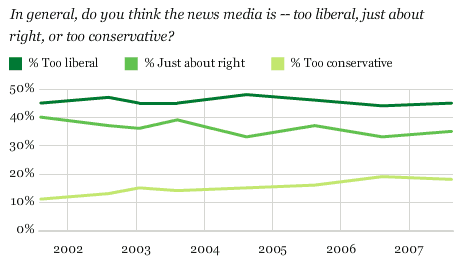
This is not a new phenomenon. The tendency on the part of Americans to perceive the news media as too liberal has been observed in each Gallup survey in which this question has been asked since 2001. Still, if there is a perceptible trend, it is the finding that the "too conservative" number has been climbing slightly throughout the decade -- from 11% in 2001 to 19% and 18% over the last two years.
Americans' views of the bias in news media are highly related -- as would be expected -- to underlying political orientation.
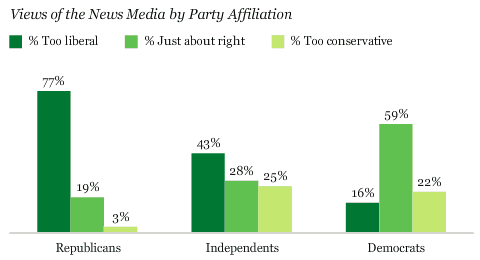
Over three-quarters of Republicans perceive the news media as being too liberal. That percentage drops to 43% among independents and only 16% among Democrats.
One might expect that Democrats would "return the favor" to Republicans and view the news media as too conservative. But that is not the case. Only 22% of Democrats say the media are too conservative. The majority say the news media are about right.
In short, while Republicans are highly likely to perceive the media as being biased toward the left, Democrats are much less likely to perceive the media as being biased toward the right. Whether or not this reflects reality (i.e., that the media are in reality more Democratic and more liberal in their orientation) is an open question not answerable by these data.
Local vs. National
There's at least one bit of good news for the news media in this research. Americans are quite a bit more convinced of the neutrality of the local news media than they are of the national media's neutrality.
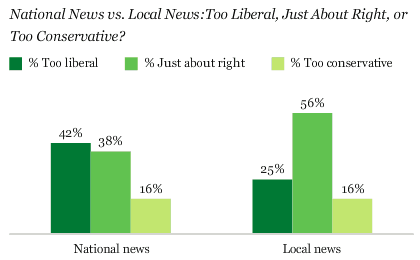
Over half of Americans say their local news media are about right in terms of ideological balance, while the remaining respondents have much more mixed views of the local media. Twenty-five percent say they are too liberal, but 16% say they are too conservative.
This is consistent with a number of Gallup findings over the years that Americans tend to perceive conditions in their local communities as more positive than conditions across the country more generally.
Survey Methods
Results are based on telephone interviews with 1,010 national adults, aged 18 and older, conducted Sept. 14-16, 2007. For results based on these samples, one can say with 95% confidence that the maximum margin of sampling error is ±3 percentage points. In addition to sampling error, question wording and practical difficulties in conducting surveys can introduce error or bias into the findings of public opinion polls.
